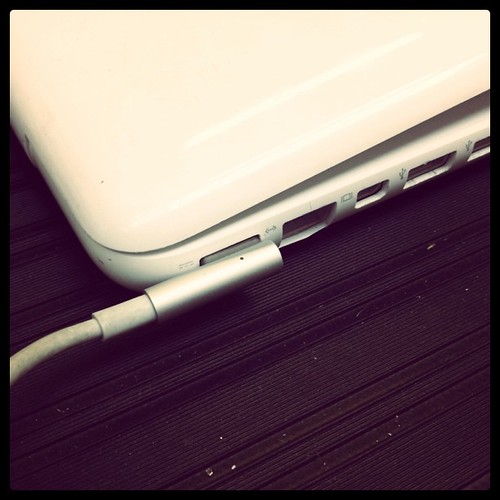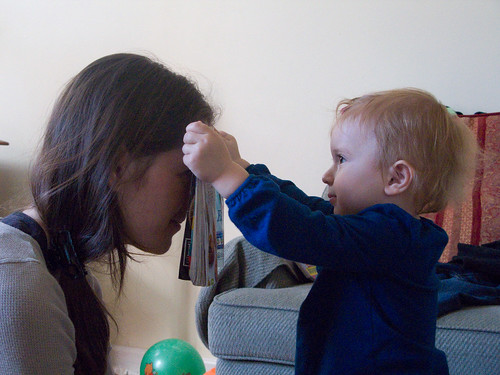4th Sunday in Ordinary Time (A)
Picture: cc Thomas Mathie
My dear friends, have you ever been troubled by a loose connection? Do you know how frustrating it can be? Some time ago, I had precisely this problem with my laptop computer. Unknown to me, there was a loose connection in the power cable. I would use it to connect the computer to the electrical supply as usual. And everything would be fine for a while. But then, later on, the connection would somehow be lost. Even though the cable was plugged in at both ends. And I would continue working on the computer, blissfully unaware that this had happened. For, as you know, the computer’s built-in battery allows it to continue running, even when disconnected from an external power source.
But the loose connection meant, of course, that the battery was not being charged. Which was very frustrating. Especially when I later needed to rely on battery power, but could not, because the battery had been depleted without me realising it. The problem became irritating enough that I finally decided to replace the faulty cable. To invest in a new one. One that I could truly rely on to power my computer. And to charge my battery.
The frustration caused by a loose connection. By a depleted battery. Sisters and brothers, have you ever experienced something like that before? If you have, you know first hand how important it is to be able to connect your machine to an appropriate power source. And just as computers need to be connected to an electrical power source. So too do we need to be connected to a spiritual power source. One that gives us the energy to live the way human beings are meant to live. In a way that brings true happiness. Not just to us. But to everyone around us as well. Enabling us to live happily and harmoniously with one another. To do this requires a certain type of power. The power to rise above our own often petty concerns and painful insecurities. So as to be able to live in love. To join with others in working for the common good. But from where do we draw this kind of power? What is the source?
The answer is found in those four words that keep getting repeated in the responsorial psalm today: It is the Lord… It is the Lord who keeps faith for ever… It is the Lord who gives sight to the blind… It is the Lord who loves the just… It is the Lord… It is the Lord who sets us free from our preoccupation with ourselves. Who enables us to reach out to those most in need of our attention and our help. It is the Lord who gives us the power to be patient and forgiving. Of others, and also of ourselves. To remain calm and at peace. Even when surrounded by trouble and conflict. Or when experiencing stress and strain. It is the Lord, who is our true spiritual Power Source. It is the Lord…
If this is true, then I am faced with a crucial question: How can I remain connected to the Lord? What do you think, sisters and brothers? How would you answer this question? Speaking for myself, my first response is often to focus on things that I need to do. Or things that I need to avoid doing. For example, I may think that I need to pray more… To complain less… To get more involved in church work… To shop less… To read the Bible more… To gossip less… Things that might be the stuff of resolutions for the new year. Even the lunar new year.
Which is fine. All of these things are, of course, very important. But doesn’t the doing of these things itself require power too? Especially if I want to do them not just once in a blue moon. Not just for the first two or three months of every year. Or whenever I happen to feel like it. But regularly. Consistently. Perseveringly. To do this requires power. Power to remain faithful to prayer… Power to resist the temptations that so often get the better of me… Power to be patient as much with myself as with others… Power that I am unable to generate on my own. Power that I need to draw from God. My only true Power Source.
Which may make it seem like something of a vicious circle, doesn’t it, my dear friends? On the one hand, I can only live a happy and harmonious life by remaining connected to God. And yet, left on my own, I don’t even have the power to do that. To connect with God. In fact, it is precisely when I mistakenly think that I do. When I forget that it is the Lord alone who is my only reliable Power Source. It is then that I so often become disconnected. And without my even realising it. Disconnected from God by my own pride and presumption. Much like how a computer might suffer from a loose connection. My interior spiritual batteries get depleted. I become more easily irritable and judgmental… Less patient… More vulnerable to temptation… Less inclined to think of the needs of others…
What then can I do? Is there no way out for me? How do I remain connected to God, my One True Power Source? The short answer, my dear friends, is that I cannot. At least not on my own. Left to my own devices, I do not even have what it takes to plug into the Divine Power Supply. I suffer from a perpetual loose connection. And yet, it is precisely when I allow myself to realise this. To acknowledge and to accept my utter helplessness and powerlessness to save myself. It is precisely at that moment that I find the possibility of being saved. For in realising this truth, I am given a chance to replace my faulty power cable. Exchanging prideful reliance on self with humble reliance on God.
Isn’t this what our readings are really about today? Isn’t this what is meant when the first reading tells us to seek integrity? To seek humility? And isn’t this why, in the gospel, Jesus teaches that the poor in spirit are happy? Blessed? Along with all those who have to endure suffering of some kind or other? What is being proposed to us, to you and to me, is not so much a programme of action for us to undertake. But a particular disposition for us to cultivate. The disposition of humility. Of poverty of spirit. An attitude that springs from the deep realisation that I do not have the power to save myself. Let alone others. That, without God, I truly can do nothing. I can’t even connect with the Power Supply.
And yet, quite paradoxically, it is precisely when I allow myself to acknowledge and to accept this, that I am then able to access God’s power. My weakness becomes my new, more reliable, power cable. For the second reading tells us that our merciful God has chosen what is foolish and weak by human reckoning… Those who are nothing at all, to show up those who are everything.
This then is the challenge that our readings place before us today: To remain connected to God, by remaining in touch with our own poverty and powerlessness. Which can be especially difficult for the rich and powerful among us. Those who are accustomed to telling people what to do. To having things go our way. It is difficult for these to rely on God. Yes, difficult… but not impossible. For even the rich and powerful are subject to weakness and powerlessness. We just have to insist on being more honest with ourselves. To dig deeper within. And to allow what we uncover to lead us, in all humility, to God.
My dear friends, loose connections can indeed be very frustrating and draining. For us, and for those around us. How are we being invited to change our faulty power cables today?



